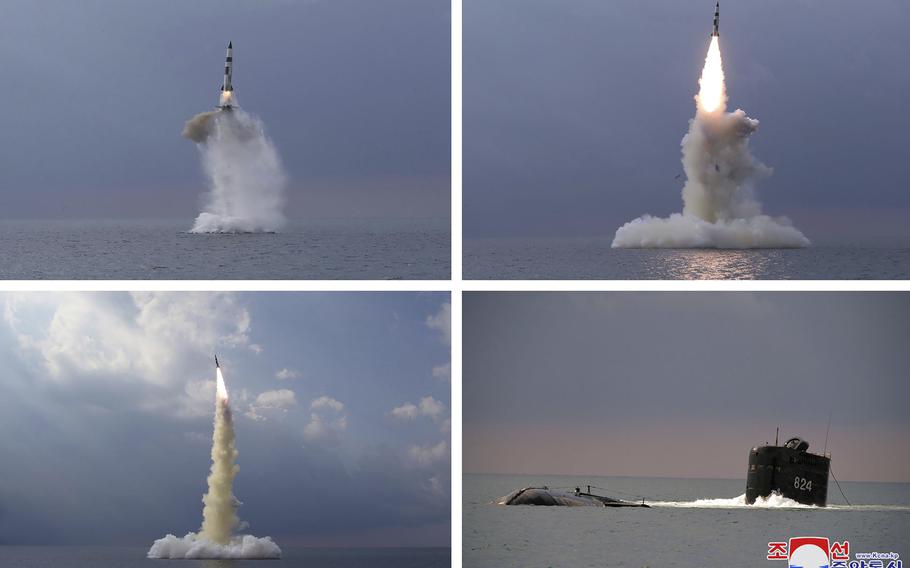
This combination of four photos provided by the North Korean government shows a ballistic missile launched from a submarine Tuesday, Oct. 19, 2021, in North Korea. North Korea announced Wednesday, Oct. 20, 2021 that it had tested a newly developed missile designed to be launched from a submarine, the first such weapons test in two years and one it says will bolster its military’s underwater operational capability. Independent journalists were not given access to cover the event depicted in this image distributed by the North Korean government. The content of this image is as provided and cannot be independently verified. Korean language watermark on image as provided by source reads: “KCNA” which is the abbreviation for Korean Central News Agency. (Korean Central News Agency/Korea News Service via AP)
UNITED NATIONS — The United States and several European countries on Wednesday condemned North Korea's recent missile tests and said Pyongyang's technical advances demonstrate the urgent need to ramp up implementation of U.N. sanctions on its nuclear and missile programs and its economic activities.
U.S. Ambassador Linda Thomas-Greenfield urged North Korea to stop its "reckless provocations" that violate Security Council sanctions resolutions. She said it should start talks with the Biden administration without preconditions toward the goal of complete denuclearization of the Korean peninsula.
She urged all countries to fully implement U.N. sanctions "so that we can prevent the DPRK from accessing the funds, the technology, the know-how it needs to further develop unlawful weapons of mass destruction and ballistic missile programs."
Thomas-Greenfield reiterated to reporters before an emergency closed meeting of the council on North Korea's latest missile tests that the United States has offered to meet officials from the Democratic People's Republic of Korea -- the country's official name -- "and we have made clear that we have no hostile intent toward the DPRK."
In a separate statement, the three members of the European Union on the Security Council -- Ireland, France and Estonia -- said Monday's reported test of a submarine-launched ballistic missile "forms part of a pattern of provocations by the DPRK" in recent weeks, including launches of short-range ballistic missiles, long-range cruise missiles, "and what it has claimed to be a hypersonic glider."
They said the new submarine missile launch "underlines the continued enhancement of the nuclear and ballistic program of the DPRK, which stated the ambition to ultimately acquire sea-based nuclear capabilities."
The EU council members urged North Korea to immediately end its "destabilizing actions and take concrete steps to abandon its ballistic missiles" and other weapons of mass destruction including its nuclear program "in a complete, verifiable and irreversible manner."
Ireland, France and Estonia also urged North Korea to respond positively to the repeated offers by the U.S. and South Korea for dialogue saying "there is no other way to achieve peace, security and stability on the Korean peninsula."
The 15-member Security Council heard a briefing on the latest missile tests from U.N. Assistant Secretary-General Mohamed Khaled Khiari, but did not issue a statement.
The council has imposed increasingly tough sanctions on North Korea severely restricting its imports and exports while demanding an end to its nuclear and ballistic missile activities. But North Korea has repeatedly flouted council resolutions and continues to launch increasingly sophisticated missiles, escalating tensions on the Korean peninsula and in the region.
Thomas-Greenfield said the Biden administration is committed to working with the international community to reduce tensions and maintain peace on the Korean peninsula. And the U.S. commitment to the defense of South Korea and Japan "is ironclad," she said.
She criticized the Security Council committee monitoring sanctions on North Korea, saying it "is not doing its job."
"We must enforce these violations," she said. "We need to ramp up the implementation of the sanctions and we've not done that. And particularly, we need to focus on those who are violating the sanctions and others who are engaging in activities that break the sanctions."
The U.S. ambassador didn't name any countries, but the panel of experts monitoring the implementation of sanctions has cited alleged violations by North Korea's neighbors China and Russia.